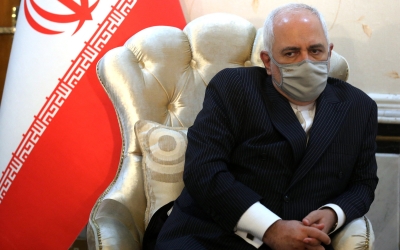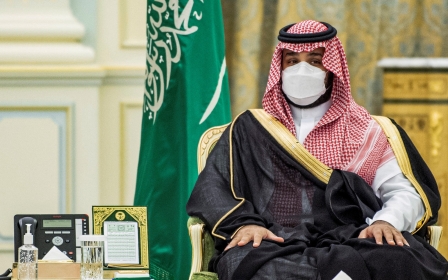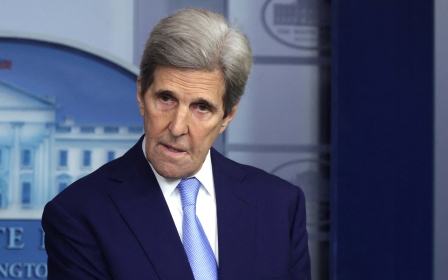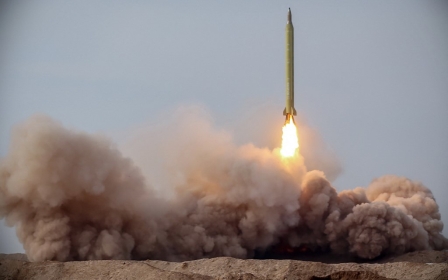No one in Iran can figure out who benefits from the Zarif audio leak
The road towards Iran’s June presidential elections was always going to be dramatic. But the leakage of an audio recording of Foreign Minister Mohammad Javad Zarif speaking candidly about the Islamic Republic has proved to be a political bomb, rocking the presidential race.
As an urbane figure who has spent decades representing Tehran in the West, Zarif has always attracted attention and ire in equal measure. This only increased in 2013, when he became foreign minister in President Hassan Rouhani’s moderate government, playing a leading role in negotiating the 2015 nuclear deal.
Zarif has often been outspoken and has sought to defuse tensions and find a working relationship with Washington, both ahead of the JCPOA nuclear deal and in the tumultuous period after Donald Trump exited the pact in 2018.
Never has he been heard this candid, however.
In the recording leaked earlier this week, Zarif for the first time reveals the domestic and foreign efforts sabotaging the deal. He was speaking as part of an oral history project led by Hesamodin Ashena, a senior adviser to the president and a former senior security official tasked with reviewing the Rouhani government's time in office.
Among a number of details disclosed about the JCPOA negotiations, Zarif revealed Russia unsuccessfully attempted to derail talks three times.
He also said then-Saudi Foreign Minister Saud bin Faisal held a meeting in Vienna with the then-US Secretary of State John Kerry, leading Washington to go back on its word and pushing the deal back several months.
Zarif then complained about the lack of balance in the Islamic Republic establishment, which he said prioritises the Revolutionary Guard’s tactics and operations on the ground over diplomacy. He is heard saying Iranian diplomacy often sacrifices itself for the benefit of the Revolutionary Guard’s operations, while the reverse never happens.
The two must be in full and balanced cooperation with each other in order to fulfill national interests, the minister claimed.
Zarif also implied that Russia invited Qassem Soleimani to scupper the deal after it had been signed, though the late Iranian general didn't want to jeapordise the JCPOA and focused on the Syrian war instead when he travelled to Moscow to meet Vladimir Putin.
Soleimani did, however, work with Zarif to reach a diplomatic solution with Saudi Arabia over Yemen, Lebanon, Iraq and Syria, the minister said. Zarif is heard saying Soleimani was no “warmonger”, as he repeatedly called on the foreign minister to find a diplomatic solution for the Yemen crisis.
Zarif also alleged that Kerry helped Tehran and Riyadh reach a ceasefire deal over Yemen, which was torpedoed by Saudi Crown Prince Mohammad bin Salman at the last minute because he believed he could win the war within three weeks.
Accusations fly
The foreign minister’s hardline opponents quickly labelled the leak a major security infiltration, citing some of the content as confidential, and stepped up attacks on Ashena, who they loath.
But in truth, a former Iranian diplomat told Middle East Eye, much of the recording’s content was publicly known or at least suspected.
“What Zarif spoke of wasn’t something that no one was aware of. The public is fully aware of Russia’s harmful role and the Revolutionary Guard’s power,” he said, speaking on condition of anonymity.
'Some are accusing Zarif as behind the leak for his electoral purposes, but I believe this wrong... This is just a conspiracy theory'
- Former diplomat
The leaks first appeared on the London-based Iran International TV channel, reportedly linked to Saudi Arabia, and suspicion has fallen on Ashena’s team working on the history project.
Fars news agency, which is close to the Revolutionary Guard, said some of those involved in Ashena’s project had previous convictions over “security” issues. Tasnim, another news agency, claimed one of them has recently applied for asylum in the US.
Fingers have also been pointed at Zarif, who is suspected to harbour presidential ambitions.
“Some are accusing Zarif as behind the leak for his electoral purposes, but I believe this wrong. Zarif is cautious and doesn’t seek adventurous matters. This is just a conspiracy theory,” the former diplomat said.
“He has tolerated all the pressures and I don’t see any reason for him to leak the audio file.”
Presidential ambitions
It would indeed be a puzzling move for Zarif.
Some believe that he may have been looking to boost his popularity with sections of society that have low opinions of Russia and the Revolutionary Guard.
But were Zarif to run for president, this will have surely dented his chances of being approved by the conservative-dominated Guardian Council, most of whose members are named by Supreme Leader Ali Khamenei and are tasked with vetting the candidates.
While Zarif has been described as the primary candidate of reformists in the upcoming election with a high chance of victory, some observers believe that hardliners were behind the leakage to give the Guardian Council enough pretext to reject him.
Hardliners have certainly made a big deal over the leak, attacking Zarif for his “unfaithful” remarks about Soleimani, who was killed in a January 2020 US drone strike and has been lionised since.
Though Zarif’s comments on Soleimani were not particularly critical, the hardliners’ tone has been perceived as an attempt to portray him as an enemy of the popular general in the eyes of the establishment, the supreme leader and the Guardian Council.
One reformist commentator, speaking anonymously due to the sensitivity of the subject, told MEE Zarif had more to lose than gain from the leak, so it likely came from his enemies.
“It is not clear what was going on behind the leakage of this audio file, but it is more likely that Zarif’s opponents wanted to pressure him ahead of the election. Most likely, the main purpose of releasing this audio file is to remove Zarif from the race,” the commentator said.
“Although he has not yet said that he will run, it is clear that the release of such a tape shakes his position in the Islamic Republic’s powerful institutions. It also makes his disqualification more likely.”
However, the commentator stressed, Zarif is not out of the race yet.
“In my opinion, although this issue puts pressure on Zarif in the short term, I feel that it can improve his image in public opinion,” they said.
“At the same time, I think that given the current turbulent situation in the country, not running for the election will be to his advantage rather than to his detriment.”
Constant target
Hardliners may have been planning to hit two birds with one stone.
By releasing the recording of comments perceived as critical of Russia and Soleimani, they may have hoped to derail ongoing talks in Vienna over reviving the nuclear deal, which would hugely increase Zarif’s popularity.
'In my opinion, although this issue puts pressure on Zarif in the short term, I feel that it can improve his image in public opinion'
- Reformist commentator
Interestingly, only three hours of Zarif’s conversation was leaked out of an alleged seven.
Meanwhile, some hardliners are accusing the reformists, who they say leaked the audio to foment an atmosphere against the Republican Guard ahead of the election.
One moderate figure who once held office in a powerful state institution poured cold water on any talk of electioneering, however.
The moderate noted that the hardliners have always sought to remove Zarif from the political scene, and the timing of this attack is of little importance.
Middle East Eye delivers independent and unrivalled coverage and analysis of the Middle East, North Africa and beyond. To learn more about republishing this content and the associated fees, please fill out this form. More about MEE can be found here.






